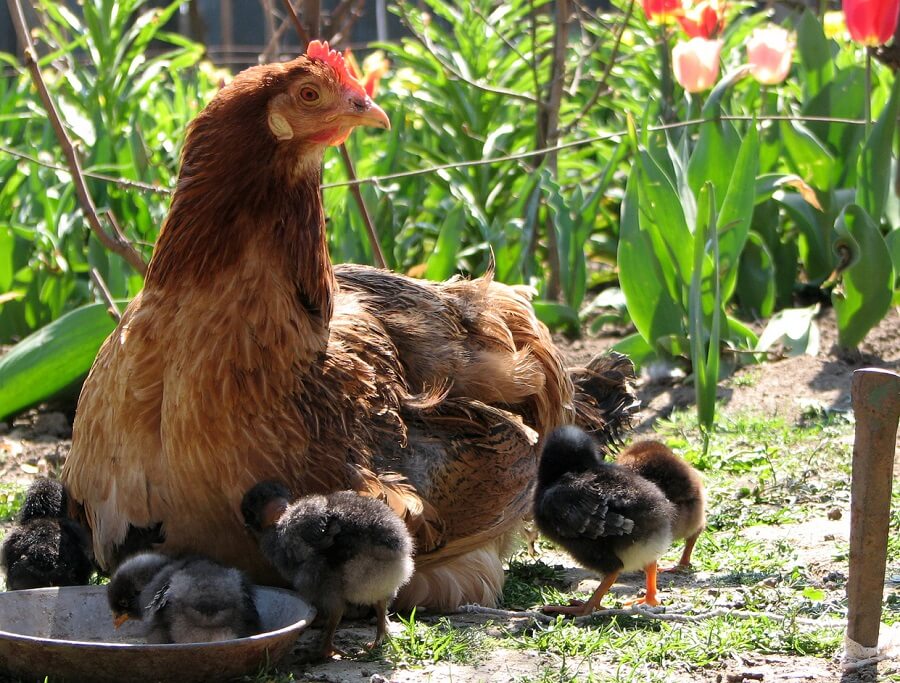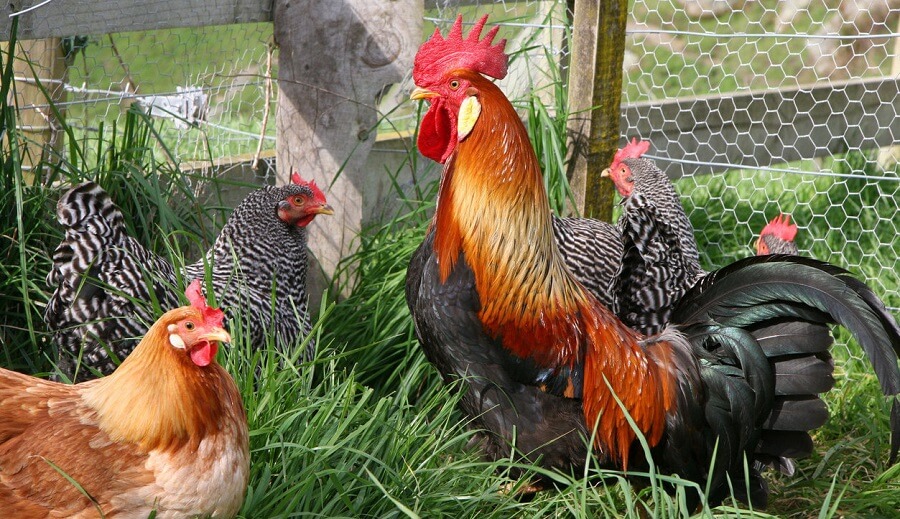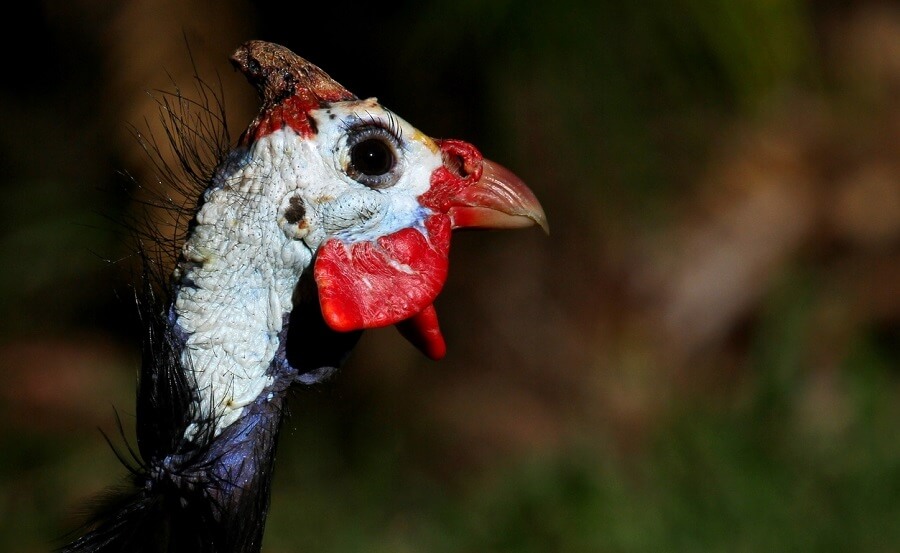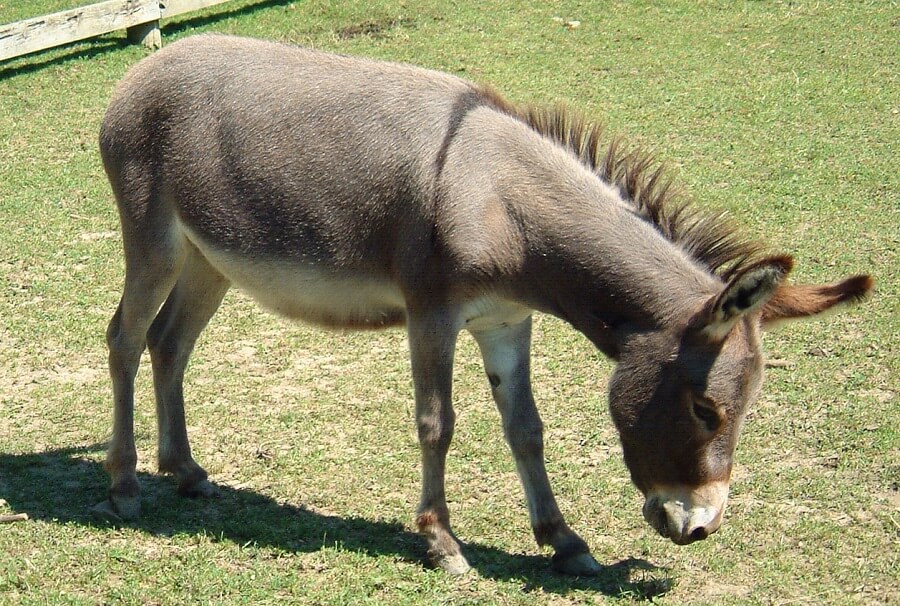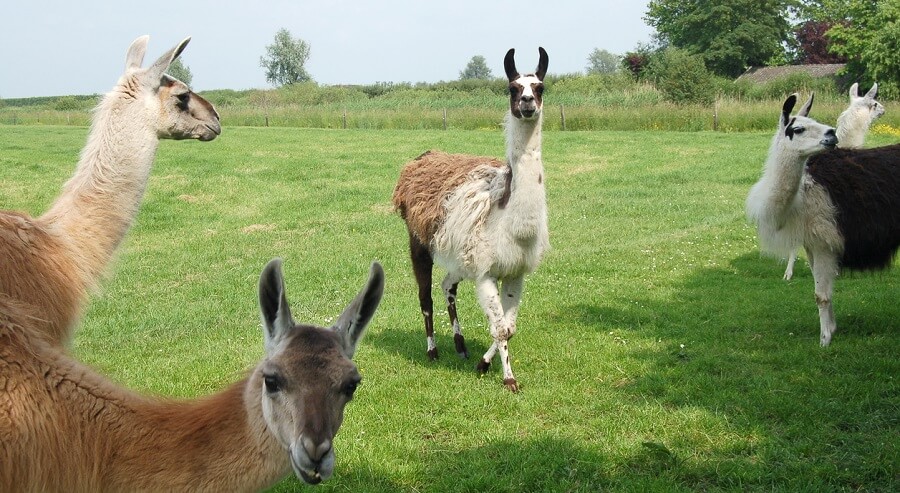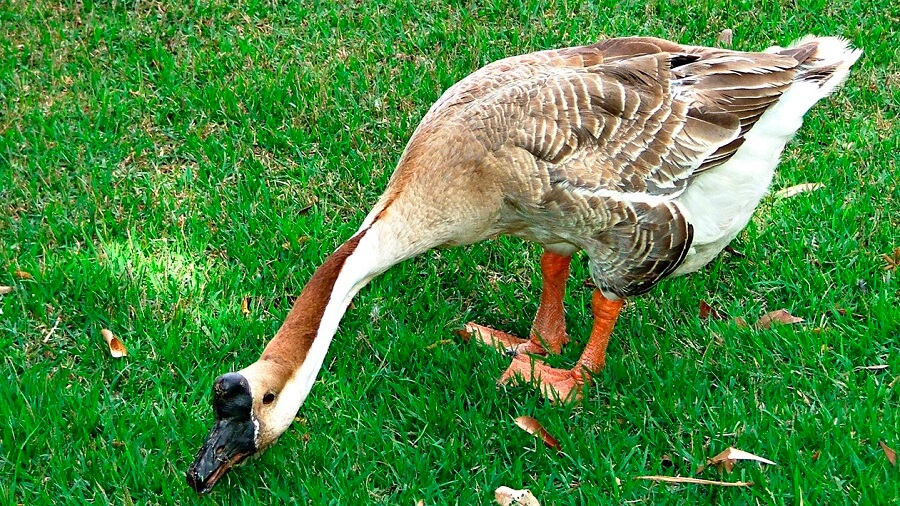Recently, a mountain lion was found in an empty irrigation ditch on my neighbor’s land. But, big cats are not the only predator attacking chickens. Foxes, weasels, rats, snakes all eat and kill chickens. Don’t forget about the neighborhood cats and dogs, who kill and eat chickens.
There are many ways to protect chickens from predators, but one of the best ways is with an animal guard. But, some animals will guard chickens and not kill them.
What is The Best Animal To Protect Chickens And Eggs?
Dogs, roosters and guinea fowl are considered the best animals to protect chickens. Alpacas and donkeys are also considered strong guard animals. These animals will sound an alarm when predators are close and will attack them and fight them, if necessary, to protect the hens and chicks. Other animals such as geese can also be used as guard animals.
But each animal poses some challenges when used for protection with chickens.
Dogs are playful creatures and can hurt or kill a hen while playing with it. Some breeds of dogs are more likely to be a chicken predator and harder to train. Hunting dogs can often turn into chicken predators.
Roosters pose very little danger to your flock. However, they can’t see well at night so nocturnal predators, such as raccoons, can be a big issue.
Guinea fowl protect against predators. But, they can have additional issues when raised with chickens. Guinea fowl are louder and more wild than chickens. The cocks can often try to mate with hens, which can cause injury.
Alpacas and donkeys are popular guard animals. They aren’t as effective as dogs, roosters or guinea fowl, but will attack a predator that comes close to them.
Best Breed Of Dog For Chicken Protection
A guard dog needs to be well trained. Once trained, they can protect the hens at all times including at night. They are also better suited to protect against large predators such as fox, mountain lions, and other large cats, as well as other dogs in the neighborhood.
If you choose to use a guard dog, some breeds are better than others. Use a dog bred as a livestock guard dog and not as a hunter. The most ideal good breeds include:
- Tibetan Mastiff
- Akbash
- Pyrenean Mountain Dog
- Kangals
- Pyrenean Mastiff
There are pros and cons to each breed. One important thing to keep in mind is that they will be less likely to kill the chickens they’re supposed to protect if they are raised around them from the beginning as puppies.
By raising them from puppies around your chickens the dog will learn that chickens aren’t toys and aren’t meant to be played with. They will also learn their scent so they can distinguish the chickens from other animals and aren’t surprised or curious about them as they get older.
Best Type Of Rooster For Protection
There are some things to consider when searching for a rooster for protection.
- Is he large or small? The larger the breed the lazier they are.
- How attentive is the rooster? Does he have his head down constantly or is he watching the sky and his hens?
- Is he aggressive and assertive but manageable?
Mid-sized breeds usually work best. They are large enough to fight off predators but small enough that they’re not lazy.
These breeds include, but aren’t limited to:
- Rhode Island Red (RIR)
- Barred Rock.
Of course, like any animal, each breed has its own temperaments and you can have both aggressive roosters and laid-back roosters with each breed.
Using Guinea Fowl To Protect Chickens
Guinea fowl are very territorial and will protect against any trespasser. This includes both animals and humans.
They can be very loud and screechy so guinea fowl aren’t usually a good option in the city. Their loud chatter helps warn other birds (including chickens) of any danger.
Guineas have retained their wildness. They like to wander and fly well. If they are raised from a keet (baby guineas) and are raised with chicks they are also more likely to come home.
One issue that guinea fowls can have, when kept with chickens, is that the cocks will sometimes try to mate with the chickens. Because their parts are different, this can cause damage to the hens. (Roosters who mate with guinea fowl hens don’t cause damage and the offspring is infertile).
Another issue that sometimes arises is that guinea fowl are at the top of the pecking order. They can conflict with roosters and may bully the hens. This can be minimized by raising them from hatching with chickens.
Using Donkeys To Protect Chickens
Donkeys are occasionally used as guard animals for chickens. Donkeys can get along with chickens well. They are more often used as a guard animals for sheep or goats.
That’s because the donkey is best at protecting against predators the donkey perceives as a danger. They often don’t perceive rats (who eat chicken eggs) as a danger. They won’t consider a hawk or owl to be a danger either.
Donkeys have a powerful kick and are used often to protect flocks. When a donkey detects an intruder it’s loud brays and quick chase usually scare off the predator. If the predator doesn’t leave it will fight by raising up on its hind legs and striking with both feet.
Donkeys usually don’t get along with dogs so using a donkey and a dog as a guard animal is not suggested.
Not all donkeys are good guard animals. Jenny’s (female donkeys) are usually used as guard animals more often than males.
The Benefits of Alpacas or Llamas to Guard Chickens
Both alpacas and llamas have an intense hatred of foxes. This can be very helpful in protecting chickens against fox attacks. They will chase most four-legged animals similar to a fox, including a dog, out of their territory.
Alpacas and llamas are different animals, although they are often confused for the same animal. They are both very territorial and will guard their space by lowering their heads and rushing toward the intruder. They can also attack using their feet when they get close.
Neither alpacas or llamas usually perceive birds of prey as a danger and won’t protect chickens as well against flying predators.
Both animals should be kept with at least one other alpaca or llama as a companion animal.
Other Guard Animals To Consider
Geese are territorial and can help protect your flock of chickens. They can fight off smaller predators such as skunks, weasels, and other rodents.
They cannot fight against larger predators such as Coyotes, large cats, or raccoons. However, they will make a lot of noise and sound a warning when a predator is near. They will also warn against eagles, hawks and other flying predators.
Keep in mind that if you have more than one goose they may be less protective of the chickens but they will still sound a warning and protect themselves and other geese.
Other Ways To Protect My Chickens
Guard animals are great to help warn your flock when predators are near and to protect them but there are some additional steps that you can take to protect your chickens without the use of guard animals. These suggestions will also help protect them at night.
By following these suggestions you may be alright if you choose to use a rooster, goose, or another animal that sleeps or can’t see at night.
By providing your flock with a safe home you can also help protect them and keep their stress levels low.
- Make sure their coop is predator-proof.
- To do this make sure the windows and doors on the coop aren’t easily opened. Predators such as raccoons have nimble fingers and can easily open latches. If there are at least 2 steps to opening the doors or gates raccoons are less likely to get in.
- Use something stronger than chicken wire such as hardware cloth, to keep predators out. Some predators are able to tear apart chicken wire. It’s good for keeping chickens in but not the best at keeping other animals out.
- Bury the hardware cloth at least 2-4 feet deep around the chicken run. This keeps animals, such as dogs and raccoons, out that like to dig.
- Don’t unwittingly invite predators over
- Keep trash cans secure.
- Mow tall grasses around the coop.
- Bring pet food in at night
- Use motion sensor lights to scare nocturnal predators away
- For other ideas on how to keep your chickens safe read our article “10 Ways to Keep Raccoons from Killing Your Chickens”. The ideas in this article apply to other predators as well as raccoons.
Related Topics
What causes stress for chickens?
- If your flock is constantly being attacked or chased this can and will stress them out. Make sure they have a safe home environment. Keep playful dogs and other pets away from their coop.
- Heat can also cause stress. Chickens don’t have sweat glands so they can cool themselves off. Make sure they have somewhere to go that is shaded and cool.
- Illness is a major factor in the stress level of your chickens. Chickens can get sick when the weather changes. Be mindful of this and check on your flock.
- Like most mothers, hens need a safe place to lay and hatch their eggs. They need to know that they can protect their chicks. Even if their eggs aren’t fertilized chickens still need a safe place to lay.
Will turkeys protect chickens?
Turkeys are not known to be good guard animals. They may be more aware of predators than chickens and have been known to fight a hawk but that is more to save themselves then chickens. Most turkeys will turn and run for shelter.
How To Train Your Dog To Protect Chickens:
It is easiest to train dogs to protect chickens if you start when they are puppies. But if you feel like your adult dog can handle it go ahead and give it a try.
- Using a leash, walk with your dog around the chicken coop and chicken run. This helps get them used to the flock. It will also introduce them to the smell. If your dog tries to chase the chickens, pull back on his leash and tell him firmly “No”.
- Make sure your dog knows the basic commands such as sit or stay. If they are already trained in the basics it will be easier to teach them how to protect your flock.
- Reward your dog for good behavior. Illustrate the good behavior first such as running toward the chickens to break up a fight. Then, when the good behavior is followed, be prepared and give him a treat or a good scratch behind the ears. Speak kindly to him.
- When your dog knows the chickens and you feel comfortable, take him into the chicken run. This reinforces that chickens aren’t toys and are meant to be protected.
- Fox and mountain lions are obvious predators, your dog will already try to run them, and other large predators off. Some chicken predators you may need to show him such as crows or hawks. If you see them in the yard take your dog with you to shoo them away from your chickens.
My Favorite Chicken and Duck Supplies
This list contains affiliate products. Affiliate products do not cost more but helps to support BestFarmAnimals and our goal to provide farm animal owners with accurate and helpful information.
Manna Pro Oyster Shell keeps eggs strong. Before I gave my chickens oyster shell, I had the oddest eggs, many with weak and irregular shells. Now, I don’t have an issue.
Layer Feed by Manna Pro. I like pellets rather than crumbles as my chickens eat them better and less gets wasted or scavenged by rodents. A good layer feed makes the difference in hens laying many more eggs.
My chickens love this mealworm treat, which gives added protein, something that’s great during molting and winter months.
There are many ways to feed and water your chickens. I like this food and water setup the best because it reduces waste, saves me time feeding and watering, and keeps the food fresh longer. Except, in the winter, I use a heated waterer. The only problem is the heated waterers need to be replaced every few years.
I love this chicken veggie hanger. It makes it easy to give your chickens produce from the garden and keep them occupied in the winter with a fresh head of lettuce.
These chicken toys are a hoot! They will help curb bullying and keep your chickens active, especially in the winter when hens tend to get more lethargic.

